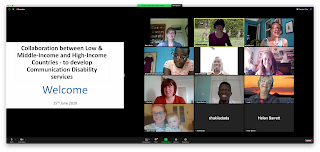The following manuscript was accepted for publication today:
Ireland, M., McLeod, S., Farquharson, K., & Crowe, K. (2020, in press June). Evaluating children in U.S. public schools with speech sound disorders: Considering federal and state laws, guidance, and research.
Topics in Language Disorders.
This paper was a wonderful collaboration with colleagues in the US resulting from our discussions about how to apply the speech acquisition normative data published in McLeod and Crowe (2018) and Crowe and McLeod (2020) to the US context regarding eligibility for services.
Here is the abstract
More than half of U.S. speech-language pathologists (SLPs) currently practice in the school setting and 92.6% of SLPs who work in schools provide services focused on children’s speech sound production (articulation and/or phonology). This paper describes evaluation and eligibility requirements for children with speech sound disorders (SSDs) in the United States focusing on four sources of information: (1) federal requirements, specifically the Individuals with Disabilities Education Act (IDEA), (2) state and local requirements and guidance, (3) other sources of guidance (e.g., from professional associations), and (4) research. To be eligible to receive services under IDEA, three conditions must be met: (1) the student has an impairment, (2) that impairment results in an educational impact, and (3) the student requires specially designed instruction to make progress. Civil rights and diversity (cultural, linguistic, and gender) within these contexts are also considered. Case examples are provided to highlight eligibility criteria and to guide SLP practice. The information and examples provided in this article will enable SLPs in the United States to navigate IDEA evaluation and eligibility requirements to ensure children with speech sound disorders who are eligible under IDEA receive appropriate services.






















